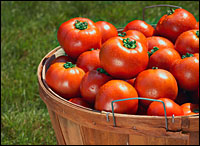As most Grist readers know by now, a few giant corporations essentially control the meat industry — they lock up the bulk of the profits and impose harsh terms on farmers, workers, livestock, and the environment. The meat they produce evidently damages those who eat it as well.

Things aren’t much different in the fresh fruit and vegetable world.
In Florida, the ever-excellent Eric Schlosser shows in a New York Times op-ed piece, the migrant farmworkers who harvest the bulk of the nation’s winter tomatoes are about to see their already-poverty-level wages slashed this holiday season. Out west, the Delta Farm Press reports, farmers are losing money selling peaches for 40 cents a pound wholesale — which big-box chains and supermarkets then turn around and sell for $3.00/pound.
In both cases, huge corporations are flexing their might, using their power as dominant buyers to suck the bulk of the profit out of the food chain. They leave behind crumbs for farmers — and even less for farmworkers.
Why are tomato growers in Florida plotting to slash wages? Schlosser puts it well:
Florida’s tomato growers have long faced pressure to reduce operating costs; one way to do that is to keep migrant wages as low as possible. Although some of the pressure has come from increased competition with Mexican growers, most of it has been forcefully applied by the largest purchaser of Florida tomatoes: American fast food chains that want millions of pounds of cheap tomatoes as a garnish for their hamburgers, tacos and salads.
In 2005, as Schlosser reports, tomato pickers got their first raise in more than a generation after a protracted battle waged by a Florida farm-workers’ union called the Coalition of Immokalee Workers. The raise amounted to a penny for every pound the laborers managed to pick — a significant boost to worker income.
In order to squeeze that penny out of the farmowners, the union knew it had to target the fast-food chains who buy most of the tomatoes. If the price farmers received for their tomatoes didn’t rise, they literally couldn’t afford to pay the workers more. So the Coalition of Immokalee Workers opened negotiations with Taco Bell, which (after a long boycott) finally agreed to pay the extra penny. In 2007, McDonald’s fell into line.
But Burger King has steadfastly refused to pay up — and now Florida’s largest tomato growers group, the Florida Tomato Growers Exchange, has used Burger King’s intransigence as an excuse to scuttle the deal with the other fast-food giants. Thus the workers will no longer get the extra penny per pound — leading to pay cuts of 40 percent. Ceding the raise would cost Burger King $250,000 per year — a rounding error in its annual profits.
Schlosser, in his expert muckraking way, traces Burger King ownership to the august Manhattan offices of Goldman Sachs, whose CEO last year earned the biggest bonus in Wall Street history and will likely do even better this year.
Burger King’s refusal amounts to a massive and seemingly nihilistic show of force — it singlehandedly wields enough buying power in the tomato market that it can on a whim nearly halve the wages of thousands of poverty-level workers. Meanwhile, the situation out in California with peach growers is all about Wal-Mart and big supermarkets throwing their weight around.
At a recent conference, the Delta Farm Press reports, a stone-fruit farmers group official had this to say:
One-third of the industry is still losing money, and one-third is breaking even, and one third is making money.
That means two-thirds of farmers are losing money or just breaking even. Why do the big retailers impose such ruinous prices on farmers? Because they can.
The large retailers need to make high profit margins on fresh produce to offset the low margins they earn by selling processed foods. The processed-food industry is itself highly consolidated, dominated by a few giants like Kraft. It’s easier for Wal-Mart and its ilk to low-ball a bunch of peach farmers than is to squeeze the likes of Kraft. So Wal-Mart drives a hard bargain on produce. Or, as the stone-fruit grower put it, "The margins for produce continue to carry the load for the rest of the items in the supermarket.”
If peaches go for 40 cents a pound on the wholesale market, I wonder what peach pickers make out in California. As always, farmers try to make up for low prices by producing more, hoping to make up on volume what they’re losing on price. I wonder what sort of environmental compromises they’re making in order to boost yields in those tomato fields and peach orchards.
Addendum: It should be noted that Burger King recently rolled out a $1 double cheeseburger.


